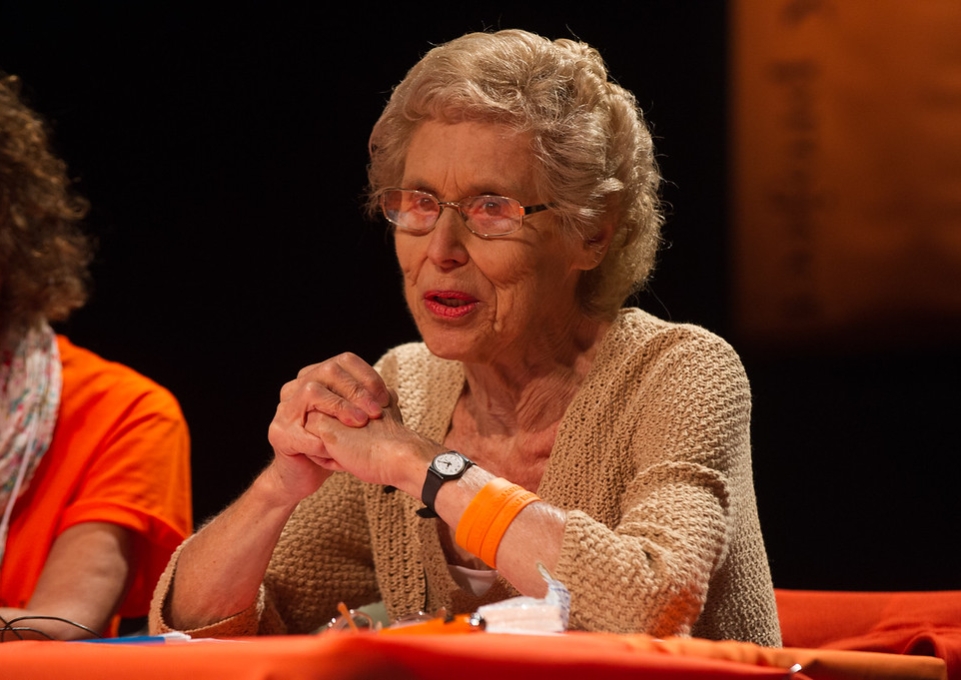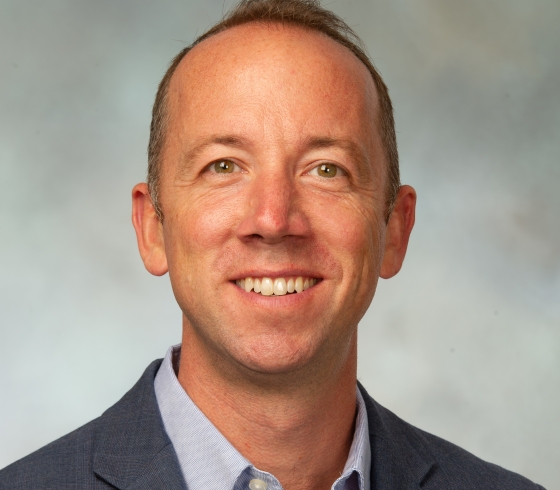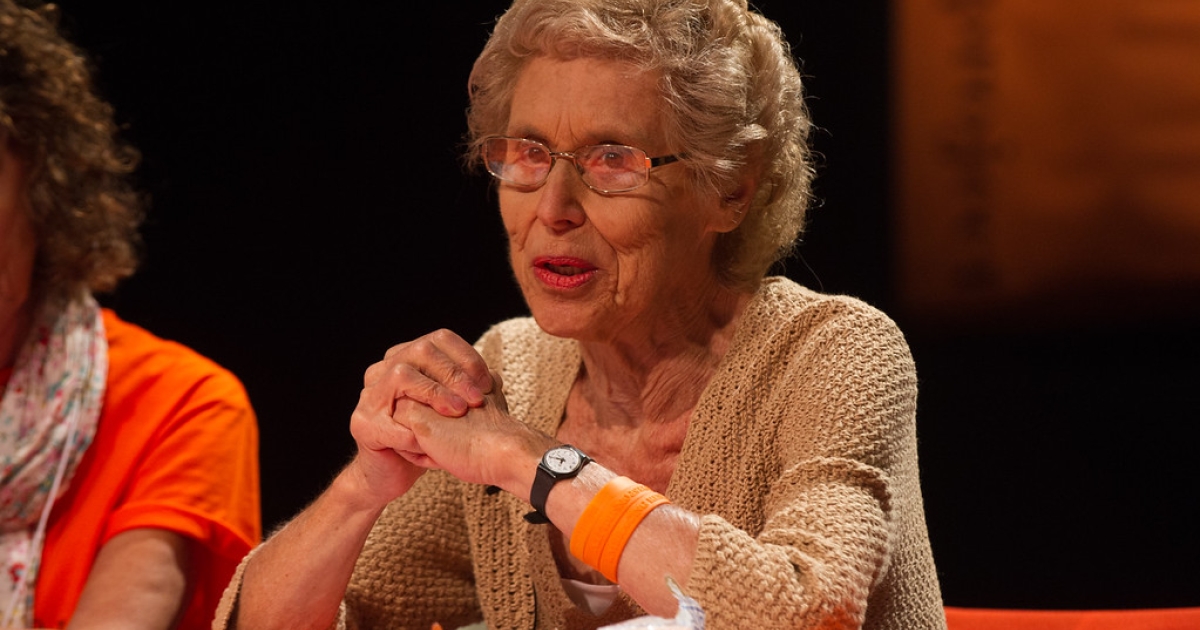
Standing on a platform as Nazi trains were taking Jews away to concentration camps, a young Sophia Veffer remembers what someone said to her:
“Tell the world what happened to us, so it will never happen again.”
That mission is at the heart of Sophia’s Legacy, a new component of the Anne Frank Project at Buffalo State University. Sophia’s Legacy, named to honor Veffer, a Holocaust survivor, is a professional development program designed to give educators the training and tools to bring lessons about genocide and conflict education into Western New York classrooms.
“While there are many excellent Holocaust and genocide education resources available to unpack the what of these issues, there exists a void in the how to bring these difficult issues into the classroom,” said Drew Kahn, SUNY Distinguished Service Professor and founding director of the Anne Frank Project. “This isn’t the teachers’ fault, as it’s not a traditional part of their education as future teachers. This is obviously difficult material to discuss with anyone, let alone students in middle and high school classrooms.
“Sophia’s Legacy will provide the tools and vocabulary necessary for teachers to bring the truth about our world’s atrocities into the classrooms and provide platforms for the students to examine these issues in unique and collaborative ways,” he said. “Current research shows the absence of this type of content in the classroom leads to dangerous outcomes with our youth: false narratives, genocide denial, and silence when informed voices are needed most.”

Drew Kahn, SUNY Distinguished Service Professor and Founding Director, Anne Frank Project
In August, work will begin with a pilot cohort of six Buffalo Public Schools teachers at no cost to the district. The first two years of Sophia’s Legacy have been funded by the Vogt Family Foundation.
Sophia’s Legacy came together with the Anne Frank Project in partnership with Buffalo State’s School of Education, the United States Holocaust Memorial Museum, and the Kigali Genocide Memorial in Rwanda, a longtime partner of the Anne Frank Project.
“Since I first met Drew on campus, he has always celebrated the fruits of great collaboration,” said Andrew Hashey, associate professor and chair of the Exceptional Education Department. “This is a hallmark of Sophia’s Legacy and has led us to seek out multiple perspectives and voices in this project. We’re all in on the notion that there needs to be many seats at this table, and we’ve been fortunate to be guided by Sophia’s longstanding commitment to making connections between the lessons from the Holocaust and the ways in which many of those same lessons continue to apply to critical issues and events across time and across the globe.
“Our focus is on developing a process by which teachers can see how they fit into the building of a more socially just world through their curricula, not only in the social studies classroom,” Hashey said. “We’re excited to partner with school leaders and teachers that see a role for all educators in this work.”

Andrew Hashey, Chair and Associate Professor, Exceptional Education Department
In advance of starting with the six teachers in August, work has been ongoing over the last year to develop the training program. It included a visit to the United States Holocaust Memorial Museum and detailed study of the Rwanda Peace Education Programme, which “promotes social cohesion, positive values—including pluralism and personal responsibility—empathy, critical thinking and action to build a more peaceful society,” along with Pascal Karangwa, director of the Buffalo Rwanda Community Organization.
“I feel incredibly honored to help this program come to fruition because there is a continuous and urgent need for Holocaust and genocide education,” said Anne-Sophie Hellman, a senior history major and Sophia’s Legacy program coordinator. “Less than half of U.S. states mandate both at the same time, and many students remain uninformed.”
The training program for teachers includes three major components:
- The content, centered on twentieth- and twenty-first-century genocides, as presented by United States Holocaust Memorial Museum Fellow Leigh-Anne Hendrick, a teacher at Chautauqua Lake High School. It will include Veffer’s personal experiences during the Holocaust.
- Trauma-informed work, for example, how teachers can handle a situation when students deal with emotional triggers, and social media literacy, led by Hashey.
- Story-based learning, taught by Kahn. This pillar of the Anne Frank Project is an innovative kinesthetic curricular platform that takes an approach of simultaneously teaching an academic lesson while also addressing the multiple socioemotional needs of students—placing the student in the center of the experience.
“Our experience in the schools, supported by current research, suggests that when teachers have acquired the tools and vocabulary to teach about our world’s most heinous crimes against humanity, they are uniquely prepared to bring all world events into the classroom to explore with their students as they happen,” Kahn said. “When tragedies occur, students hear about it before they come to school and are confused when it‘s not part of their classroom conversations. This leads to the disconnect we see now between what’s happening in their schools and what’s happening in their lives.”
Following the training, Sophia’s Legacy team members will join the teachers in their classrooms with their students to assist with the application of Sophia’s Legacy.
“This is more than just a new subject,” Kahn said. “This work leads to enhanced and more equitable classroom cultures. It’s important to keep in mind that this is a heavy lift for teachers, so we want to be with them each step of the way.
“An essential ingredient for genocide to be successful is good people must do nothing while it’s being planned and executed,” he said. “Unintentionally, Western education has created millions of bystanders by rewarding silence and stillness in the classroom. Silence and stillness are the opposite of activism. We must, through programs like Sophia’s Legacy, arm our young people with the truth and then teach them multiple ways of sharing the truth. The greatest weapons against repeated genocides are empathetic children armed with the truth.”
The 94-year-old Veffer, a regular visitor to the Anne Frank Project space on the fourth floor of the Campbell Student Union, said the Sophia’s Legacy program model is important because “the younger generation will be the one to drive change.”
“If you go to today’s teachers,” Veffer said, “and ask if they know about the Armenian genocide, the answer is no. It was after the first World War. Why don’t we teach about it? Once that whole generation died out, nobody discussed it. You have to talk about it. My theme is don’t be a bystander; be an upstander.”



